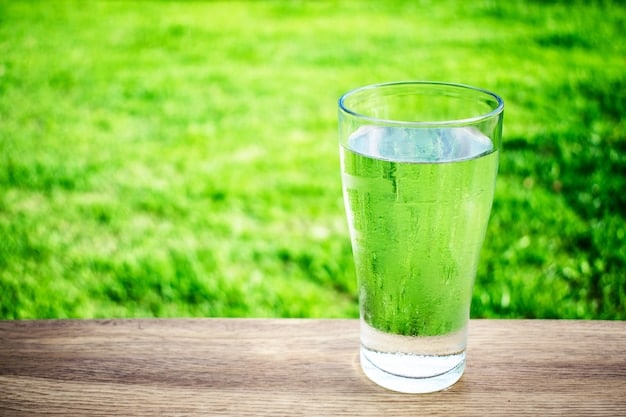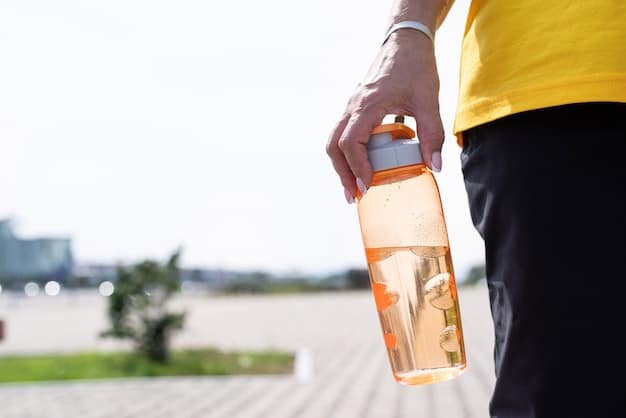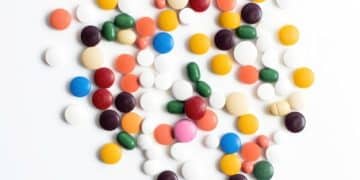Stay Hydrated: Why Water Matters and How Much You Need

Stay Hydrated: The Importance of Water and How Much You Really Need is crucial for maintaining overall health, regulating body temperature, and supporting vital functions. Understanding your individual hydration needs is key to well-being.
Staying hydrated is essential for life. Water is involved in virtually every bodily function, from regulating temperature to transporting nutrients. But how much water do you really need, and why is it so important to stay hydrated: The importance of water and how much you really need may be more than you think.
In this guide, we’ll explore the crucial role of water in maintaining your health and provide practical tips to ensure you’re adequately hydrated every day. Let’s dive in!
Stay Hydrated: The Core of Health and Wellness
Water is the lifeblood of our bodies, making up about 55% to 78% of our total mass. It’s involved in everything from transporting nutrients and oxygen to cells to flushing out waste products. Understanding the importance of stay hydrated: The importance of water and how much you really need is the first step towards a healthier you.
Why Is Water So Important?
Water is not just a thirst quencher; it’s a vital component in numerous bodily functions. Without adequate water intake, these functions can become impaired, leading to various health issues.
- Temperature Regulation: Water helps regulate body temperature through sweating. When you’re hot, your body sweats, and as the sweat evaporates, it cools you down.
- Nutrient Transport: Water carries nutrients and oxygen to your cells, ensuring they have what they need to function properly.
- Waste Removal: Water helps flush out waste products through urine and bowel movements.
- Joint Lubrication: Water lubricates your joints, helping to reduce friction and pain.
Failing to stay properly hydrated can lead to dehydration, which can manifest through headaches, fatigue, and even more serious consequences. Recognizing the benefits of staying hydrated is crucial for preventing these issues, and understanding that stay hydrated: The importance of water and how much you really need relies on meeting your body’s requirements.

How Much Water Do You Really Need?
Determining how much water you need isn’t a one-size-fits-all answer. Factors such as your activity level, climate, and overall health play a significant role. But understanding the basics can help you make informed decisions about your daily water intake. So, to stay hydrated: The importance of water and how much you really need to consider the variables affecting individual hydration levels.
General Guidelines for Water Intake
A commonly cited recommendation is the “8 x 8 rule,” which suggests drinking eight 8-ounce glasses of water per day. However, this is just a general guideline, and your actual needs may vary.
- The 8 x 8 Rule: While a good starting point, remember this might not be enough if you’re very active or live in a hot climate.
- Listen to Your Body: Pay attention to your thirst cues. If you’re thirsty, drink!
- Consider Your Diet: Many fruits and vegetables have high water content, contributing to your overall hydration.
Staying attuned to your body’s specific signals and adjusting your fluid intake accordingly will enhance your ability to stay hydrated: The importance of water and how much you really need and maintain optimal health.
The Science Behind Hydration
Understanding the science behind hydration can offer a deeper appreciation for why water is so vital. It helps to know how water interacts with your cells and organs, and how your body regulates fluid balance. Here, we dig into the core processes that underscore the importance to stay hydrated: The importance of water and how much you really need.
How Water Keeps You Alive
Water is essential for maintaining the right balance of fluids in your body. This balance ensures that your cells can function properly and that vital organs receive the necessary support.
Effective hydration is not just about drinking enough water, but about maintaining the right amount of fluids inside and outside your cells. Key minerals and electrolytes from sodium and potassium facilitate this balance, enabling nutrients and oxygen for cellular activity.
When exploring the mechanisms behind stay hydrated: The importance of water and how much you really need, it becomes obvious that hydration is a central element not only for immediate well-being, but also to support sustained health. Without enough hydration, the body would struggle to perform its daily functions, putting it at risk for a variety of health issues.

Tips to Stay Hydrated Throughout the Day
Incorporating good hydration habits into your daily routine is easier than you might think. Here are some simple tips to help you stay hydrated: The importance of water and how much you really need daily.
Easy Ways to Boost Your Water Intake
Making small changes to your daily habits can significantly increase your water consumption.
- Carry a Water Bottle: Having a reusable water bottle with you makes it easy to sip throughout the day.
- Set Reminders: Use your phone or a water tracking app to remind you to drink regularly.
- Flavor Your Water: Add slices of lemon, cucumber, or berries to make your water more appealing.
Make it a Habit
Drinking water should be as habitual as brushing your teeth. By integrating these tips into your routine, you can ensure you remain adequately hydrated, supporting your overall health and feeling your best. When you make it a part of your life to stay hydrated: The importance of water and how much you really need, you are more likely to sustain consistency and achieve long-term hydration.
Debunking Hydration Myths
There are many misconceptions about hydration, and separating fact from fiction can help you make better choices about your fluid intake. Understanding these will further demonstrate that stay hydrated: The importance of water and how much you really need is actually vital.
Common Misconceptions
Let’s take a look at some common hydration myths and the truth behind them.
It’s often mistakenly believed that thirst is a reliable indicator of hydration levels; however, by the time you feel thirsty, you might already be slightly dehydrated. Relying solely on thirst to stay hydrated: The importance of water and how much you really need can leave you lagging behind in fluid intake. Another pervasive belief is that if you drink a lot of water with your meals, it will mess up your digestive system. In reality, water helps break down food and improves nutrient absorption, as well as helps keep everything flowing through your digestive system.
These myths can potentially undermine real efforts to maintain adequate hydration. Discarding these misconceptions means a real opportunity to optimize how you stay hydrated: The importance of water and how much you really need.
| Key Point | Brief Description |
|---|---|
| 💧 Basic Hydration | Sufficient water maintains body functions. Aim for 8 glasses a day! |
| 🍎 Hydrating Foods | Fruits and veggies contribute to hydration levels. |
| 🌡️ Factors Affecting Needs | Individual needs vary based on activity level and climate. |
| 🏃♂️ Hydration Habits | Carry a bottle and set reminders. |
Frequently Asked Questions
Staying hydrated is crucial for maintaining body temperature, transporting nutrients, and removing waste. Stay hydrated: The importance of water and how much you really need is shown through the vital role it plays in many bodily functions.
A general guideline is to drink eight 8-ounce glasses of water per day, but this can vary depending on activity level, climate, and overall health. Consider your individual needs.
Yes, sports drinks, juice, and even caffeinated drinks can help, but remember that water is the purest form of hydration. Also many fruits and vegetables contain a lot of water and can help to stay hydrated: The importance of water and how much you really need.
Common signs include thirst, dry mouth, fatigue, dizziness, and dark urine. Paying attention to these signs and addressing them can prevent dehydration.
Yes, though rare, drinking excessive amounts of water can lead to hyponatremia, a condition where sodium levels in the blood become dangerously low. Balance is key to stay hydrated: The importance of water and how much you really need!
Conclusion
Staying hydrated is a cornerstone of good health, impacting everything from energy levels to bodily functions. By understanding your individual needs and incorporating simple habits into your routine, you can stay hydrated: The importance of water and how much you really need to live a healthier, more vibrant life.





